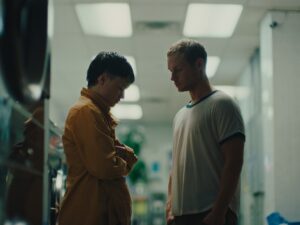When it comes to recent queer cinema, the more things change, the more they stay the same. And that’s not necessarily a bad thing.

Take, for example, the raunchy high-school comedy Bottoms, which has recently been screening in local cinemas. Directed by Emma Seligman from a script by Seligman and Rachel Sennott (who also stars), Bottoms first appeared locally at the Provincetown International Film Festival in June, where it generated a good deal of positive buzz. It’s now in theaters with a major studio distributor, MGM, owned by Amazon.
Despite many jokey references to Fight Club, the hyperviolent Brad Pitt thriller from years back, Bottoms more closely resembles American Pie and Porky’s or any of the “zany” and mostly preposterous lose-your-virginity-in-high-school romps that have been common fare from Hollywood studios and hugely successful.
But this is not your grandfather’s sex comedy. Horniness, humiliation, and potty humor still abound, as usual, but Bottoms features two out lesbians as leads — Josie (Ayo Edebiri), and PJ (Sennott), sympathetic losers who have crushes, respectively, on beautiful cheerleaders Isabel (Havana Rose Liu) and her BFF, Brittany (Kaia Gerber). Isabel is dating Jeff, a football star, and the cheerleaders treat Josie and PJ like lower-class riffraff.
Josie and PJ stumble onto a plan to conquer their romantic dream girls and get laid: they start a women’s “self-defense” club even though they know nothing about it. And, because of boyfriend squabbles and the threat of violence by students at a rival high school — who aim to literally kill Jeff at an upcoming football game — the ruse works: both Isabel and Brittany join the club and eventually succumb to Josie and PJ’s dubious charms.
That’s the plot in a nutshell, though the script is chock full of narrative complications and clever patter. And while the jokes, pop references, and sensibility are decidedly queer and the cast racially diverse, the basic structure (or chaos) of the comedy, and the logic (or illogic) of the storytelling, are quite old-fashioned.

Seligman is a competent director, and she keeps things moving fast enough for us to ignore the implausibility of what’s going on and even the moral trespasses. At its heart, the movie isn’t the slightest bit rebellious or provocative: explosions and physical violence aside, it’s actually pretty tame and politically correct. It comes off like a major studio film — far slicker than a niche LGBTQ audience might expect. But then again, Bottoms appears to be targeting the mainstream.
I experienced a similar feeling of déjà vu while watching Mutt, a new queer movie that follows a dramatic day in the life of a trans male protagonist. It’s written and directed by Vuk Lungulov-Klotz and stars Lío Mehiel — both trans men. Unlike Bottoms, it’s a revelatory, dazzling work of art that heralds the arrival of exciting new talent.
Mutt reminded me of what it was like to see Mean Streets at its premiere at the New York Film Festival in 1973, where I and much of the audience wondered who Martin Scorsese and Robert De Niro were. I’d never heard of them.
Mutt premiered at the Sundance Film Festival in January, where Mehiel won a Special Jury Award for his performance. It played the Provincetown fest in June (where I caught it) and is now being released only in theaters, opening at the Waters Edge Cinemas in Provincetown on Friday.
The grainy, gritty street look of Mattew Pothier’s lovely cinematography in the film also recalls Mean Streets, but Lungulov-Klotz, who is making his feature directorial debut, is less concerned with exploring the macho rites of an urban subculture in downtown New York City (like Scorsese) than he is with taking his young lead on an existential journey.

Mehiel’s character, Feña, is still experiencing the rough edges of gender transition. Having undergone top surgery recently, he remains somewhat androgynous, and as the movie begins, he’s about to contend with several people from his past with whom he hasn’t quite reconciled. In a bar, he meets his straight ex-boyfriend, John (Cole Doman), and it becomes immediately clear that the breakup was rough and that feelings remain raw. He also is about to spend time with his estranged much younger half-sister, Zoe (MiMi Ryder), and divorced dad (Alejandro Goic), borrowing John’s car to drive with Zoe to the airport where dad is waiting.
Each step of the way, things go wrong. Obstacles confront Feña with regularity, and like Job, he struggles through it, aggravating all his loved ones and trying, with little confidence, to explain himself. A lot of anger erupts and hesitant affection is offered in these scenes, and it plays out in an utterly human and real way.
With the help of his impressive young queer cast and crew, Lungulov-Klotz turns a relatively mundane story into a suspenseful and powerful drama. He evokes the loneliness, confusion, and determination of gender transition with remarkable ease, and while I can only speak for my cisgender self, I suspect that audiences of all identities will find that the film speaks to them. It’s a cinematic triumph.



